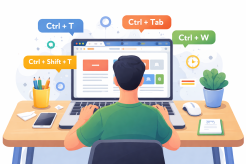Affordable Internet Options for Low-Income Families

Staying connected has never been more essential, whether it’s for work, education, or staying in touch with family and friends. However, for low-income families, high internet bills can be a real challenge. The good news is that there are multiple programs available to help reduce internet costs, including government assistance programs and special offers from Internet Service Providers (ISPs).
These programs are designed specifically to support low-income households, ensuring that everyone has access to reliable internet without breaking the budget. From discounted high-speed plans to free equipment and no installation fees, these initiatives make digital access more attainable than ever.
Related: Check out our guide on True Free and Discounted Internet Plans for more ways to save.
Government and ISP Programs for Affordable Internet
Several major ISPs partner with government programs to offer affordable internet options for low-income families. These programs typically provide:
- Discounted monthly rates
- No-term contracts
- Free installation and equipment
- Options for in-home Wi-Fi
Below, we’ve outlined some of the most popular programs currently available.
AT&T Access
AT&T Access is designed to provide low-cost internet for households participating in government assistance programs.
Plan Details:
- $10 per month (plus taxes)
- Speeds up to 10 Mbps
- No term commitment
- No deposit required
- Free installation and in-home Wi-Fi modem
Eligibility Requirements:
- At least one household member must participate in the Supplemental Nutrition Assistance Program (SNAP) or receive Supplemental Security Income (SSI) for California residents.
- No outstanding AT&T fixed internet debt in the last six months.
Learn more: Call (844) 319-1735 for assistance.
Connect2Compete by Cox
Cox Connect2Compete provides affordable internet for families with school-aged children.
Plan Details:
- $9.95 per month (plus taxes)
- 10 Mbps speed
- No term commitment
- Free installation and Wi-Fi modem
Eligibility Requirements:
- At least one K–12 student in the household
- Participation in one of these programs: National School Lunch Program (NSLP), SNAP, TANF, or public housing
- Must not have subscribed to Cox High-Speed Internet in the past 90 days or have unreturned equipment
Learn more: Call (844) 280-8276.
Frontier Fundamental Internet Service
Frontier Fundamental offers flexible, low-cost internet for qualifying households.
Plan Details:
- $19.99 per month (plus taxes; $14.99 service + $5 router fee)
- Speeds vary depending on the service type
- No term commitment
- Free installation
Eligibility Requirements:
- Participation in programs such as CalFresh, SSI, Medi-Cal, or the Bureau of Indian Affairs (BIA)
- Must be a new Frontier Internet customer
- Some applicants may also receive a free Chromebook
Learn more: Call (844) 280-8276.
Google Fiber – Broadband Plan
Google Fiber offers high-speed internet for underserved neighborhoods with low connectivity rates.
Plan Details:
- $15 per month (plus taxes)
- Speeds up to 25 Mbps
- No term commitment
- Free in-home Wi-Fi modem and installation
Eligibility Requirements:
- Household must be located in a Google Fiber service area with low internet penetration
Learn more: Call (888) 317-7540.
Connect2Compete by Mediacom
Mediacom Connect2Compete helps families with children access affordable internet.
Plan Details:
- $9.95 per month (plus taxes)
- 10 Mbps speed
- No term commitment
- Free installation and Wi-Fi modem
Eligibility Requirements:
- At least one child in the household participates in the NSLP
- Must not be a current Mediacom internet subscriber or have unreturned equipment
Learn more: Call (877) 205-7913.
Spectrum Internet Assist
Spectrum Internet Assist is ideal for seniors and low-income families.
Plan Details:
- $14.99 per month (plus taxes), $5 extra for in-home Wi-Fi
- Speeds up to 30 Mbps
- No contract
- Modem included
Eligibility Requirements:
- Participation in NSLP, Community Eligibility Provision (CEP), or receiving SSI (age 65+)
- Must not be a current Spectrum subscriber or have outstanding bills
Learn more: Call (844) 273-1634.
Tips for Choosing the Right Low-Income Internet Program
- Check Eligibility Carefully – Each program has specific requirements based on government assistance programs or school participation. Confirm eligibility before applying.
- Compare Speeds and Costs – Consider what you need for work, school, or streaming. Even discounted plans offer varying speeds.
- Look for Free Equipment – Many programs include a modem or Wi-Fi router to reduce upfront costs.
- Consider Contract Terms – Most low-income programs have no long-term commitment, giving flexibility if your circumstances change.
- Check for Additional Benefits – Some programs provide free devices like Chromebooks, which can help students stay connected.
Why Affordable Internet Matters
Internet access is no longer a luxury—it’s a necessity. Reliable connectivity allows families to:
- Support students with remote learning
- Apply for jobs and complete online applications
- Access telehealth services
- Stay connected with community resources
Low-income internet programs are a lifeline for families who might otherwise be cut off from essential digital resources.
How to Apply
- Visit the program’s official website
- Check eligibility requirements
- Fill out the application form
- Submit required documentation (proof of income, government assistance, or school enrollment)
- Schedule installation (usually free)
If you need help, most ISPs provide dedicated support lines to guide applicants through the process.
Important: Availability and eligibility are confirmed during application. Always review the ISP’s official website for the most accurate information.
Conclusion
Affordable internet options make it possible for low-income families to stay connected and access opportunities online. Whether through AT&T, Cox, Frontier, Google Fiber, Mediacom, or Spectrum, there’s a plan that can fit your needs and budget.
By understanding each program’s requirements and comparing plans, families can save money without sacrificing speed or reliability.
Start exploring these programs today and take a step toward affordable, reliable internet for your household.
Related Posts
 Internet Bundles
Technology
Internet Bundles
Technology
Is AT&T Customer Service Good? Support Review
Is AT&T customer service good? Explore support options, phone numbers, live chat access, and real performance insights for residential and business users.
 Internet Bundles
Internet Bundles
Top Fiber Internet Providers in the U.S. Ranked by Speed
Discover the top fiber internet providers in the US, their speeds, pricing, and customer satisfaction ratings. Find the best plan for fast, reliable, and uninterrupted internet.
 Technology
Technology
25 Best Travel Apps to Make Every Trip Easier in 2026
Discover the best travel apps for planning, navigation, budgeting, security, and communication to make every trip easier and more efficient.
 Internet Bundles
Technology
cheap internet offers
Internet Bundles
Technology
cheap internet offers
What is the Best 4k Streaming Service?
Compare the best 4K streaming services in 2026, including Netflix, Disney+, Hulu, Prime Video, and more. Find the right Ultra HD platform for you.
 Technology
Technology
Faster Browsing: Essential Keyboard Shortcuts Guide
Boost browsing speed with essential keyboard shortcuts for all major web browsers. Learn faster navigation, tab control, and productivity tips.